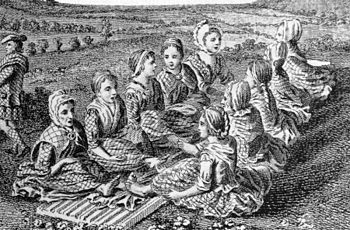- Waulking song
-
Waulking songs (Scots Gaelic: Òrain Luaidh) are Scottish folk songs, traditionally sung in the Gaelic language by women while waulking cloth. This practice involved a group of people beating newly woven tweed rhythmically against a table or similar surface to soften it. Simple, beat-driven songs were used to accompany the work.
A waulking session often begins with slow-paced songs, with the tempo increasing as the cloth becomes softer. As the singers work the cloth, they gradually shift it to the left so as to work it thoroughly. A tradition holds that moving the cloth counter-clockwise is unlucky.
Typically one person sings the verse, while the others join in the chorus. As with many folk music forms, the lyrics of waulking songs are not always strictly adhered to. Singers might add or leave out verses depending on the particular length and size of tweed being waulked. Verses from one song might appear in another, and at times the lead singer might improvise to include events or people known locally.
The chorus to many waulking songs consists of meaningless vocables, serving a function similar to 'tra la la' or 'hey hey hey' in other song forms.
Some waulking songs have a strict verse-and-chorus structure. In other songs, the vocables are sung at the end of each line of a verse. In a song like 'S Fliuch an Oidhche ('Wet is the Night'), also known as Coisich a Rùin ('Come on, My Love'), the last two lines of one verse become the first two lines of the following one.
A tradition holds that it's bad luck to repeat a song during a waulking session, which may explain in part both the many verses of some songs and the large number of songs.
While waulking is a common practice across the world, it is only in Scotland that music became so strongly associated with it as to become an important cultural feature.
Waulking is rare in Scotland today, mostly confined to the Outer Hebrides where it is carried out as a celebration of heritage. The last true waulking (for the purpose of making cloth) is believed to have occurred during the 1950s.[citation needed]
During the Highland clearances, traditional methods of waulking spread with the Scottish diaspora. In Nova Scotia, and in particular on Cape Breton Island, waulking is known as milling. Although in Scotland women waulked cloth, in Nova Scotia both men and women took part in milling frolics. The practice continues as a cultural celebration today.
See also
External links
Categories:- Scottish culture
- Work music
Wikimedia Foundation. 2010.

